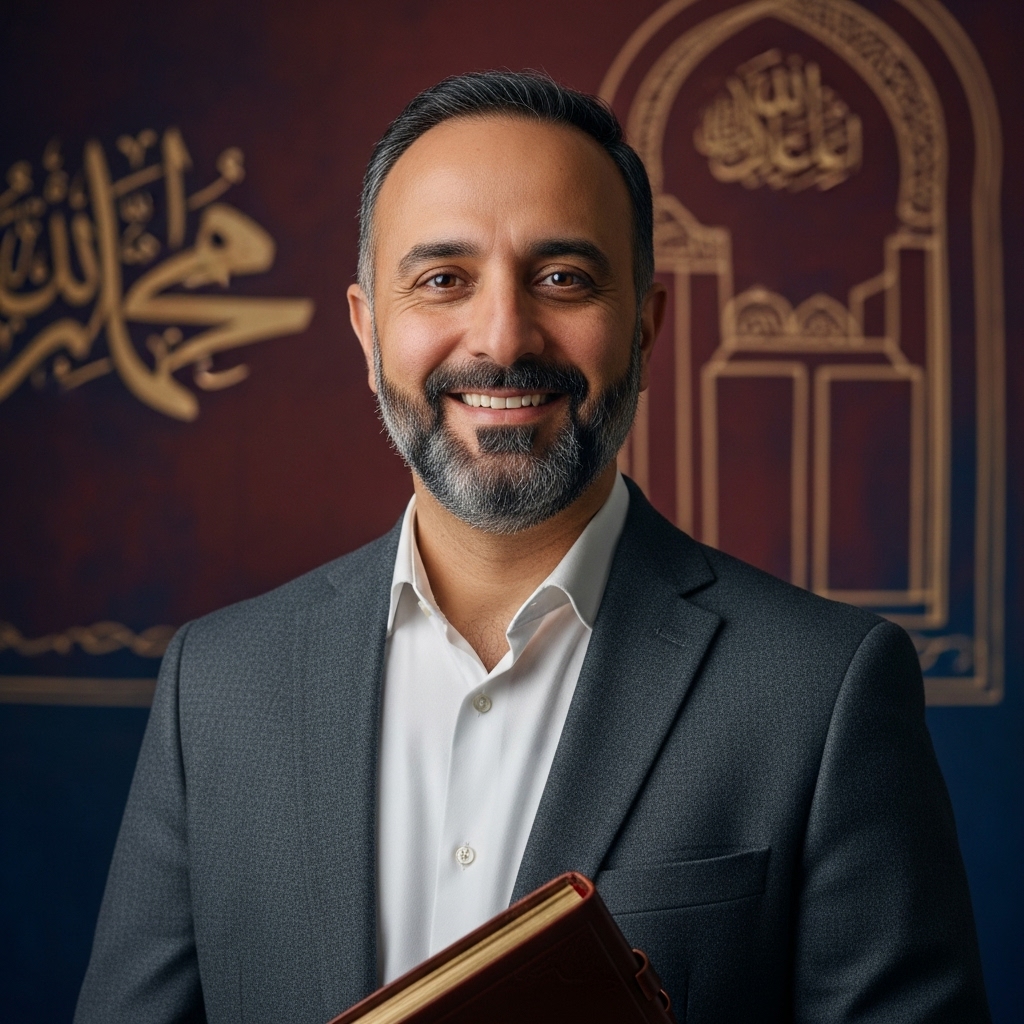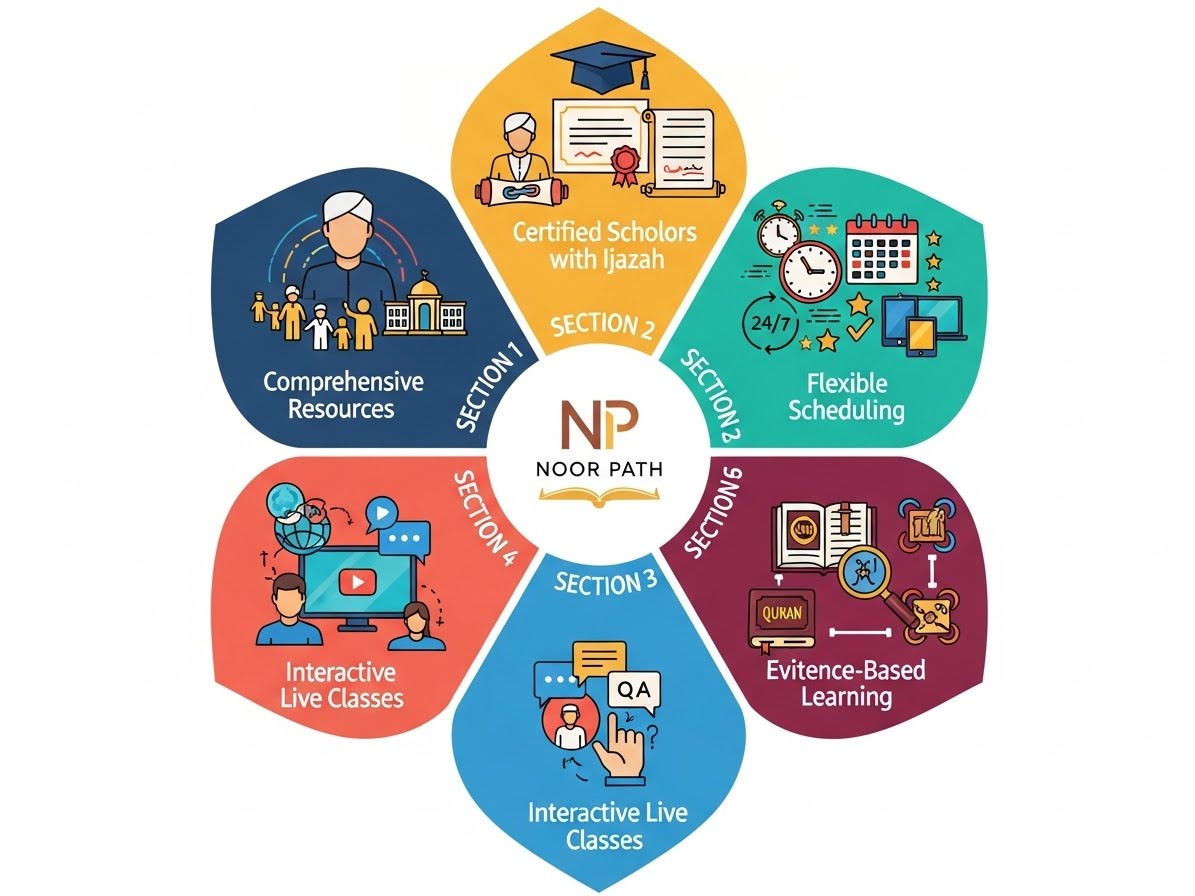Fiqh – Course Details
Learn Islamic Fiqh Online with Expert Scholars
Transform your understanding of Islamic jurisprudence with structured lessons from certified Fiqh experts. Study at your own pace, from anywhere in the world.
No credit card required. Setup takes 2 minutes
⭐️ 5-Star Rated by 500+ Students | 100% Satisfaction Guarantee
Trusted by Muslim Families Across The Globe
Featured In Muslim Mamas



Struggling to Understand Islamic Rulings in Your Daily Life?
Many Muslims find themselves unsure about proper Islamic practices in their everyday lives. Without proper Fiqh knowledge, even simple questions about prayer, fasting, business transactions, or family matters can feel overwhelming and confusing.
- Finding Time is Difficult: Busy schedules make it nearly impossible to attend traditional Islamic classes or travel to scholars for guidance.
- Conflicting Information Everywhere: The internet is full of conflicting opinions and incomplete answers, leaving you more confused than before.
- No Access to Qualified Scholars: Many communities lack access to knowledgeable scholars who can provide authentic, structured Fiqh education.
You deserve clarity in your practice of Islam. That’s why we’ve created a comprehensive online Fiqh course that brings expert Islamic scholarship directly to your home, on your schedule.
Our Proven 3-Step Method for Fiqh Mastery
1. Visual Mastery (Articulation)
We use clear visual aids, real-life scenarios, and practical examples to help you understand complex Fiqh principles. Every ruling is explained with context, evidence from Quran and Sunnah, and practical application guidance.
2. Rule Demonstration (Understanding)
Our certified scholars break down each topic step-by-step, demonstrating how to apply Fiqh rulings in modern contexts. You'll learn not just the "what" but the "why" behind each Islamic ruling.
3. Active Correction (Application)
Through interactive sessions and Q&A opportunities, you'll practice applying Fiqh knowledge to real scenarios. Your tutor provides personalized feedback to ensure accurate understanding and implementation.
A Clear Path from Beginner to Fiqh Mastery
- Level 1: Foundations of Fiqh Master the essential principles of Islamic jurisprudence and learn the sources of Fiqh rulings. You'll understand how scholars derive rulings from the Quran, Sunnah, Ijma, and Qiyas. This foundational knowledge prepares you to comprehend more complex jurisprudential discussions with confidence.
- Level 2: Worship & Purification (Ibadat & Taharah) Dive deep into the rulings of purification, prayer, fasting, Zakat, and Hajj. Learn the correct method for each act of worship, understand conditions of validity, and master how to handle exceptional circumstances. You'll gain certainty in your daily worship practices.
- Level 3: Transactions & Interpersonal Relations (Mu'amalat) Explore Islamic rulings on business transactions, contracts, marriage, divorce, inheritance, and financial matters. Understand how to conduct yourself in modern economic situations while adhering to Shariah principles. This level empowers you to make halal choices in your professional and personal life.
- Level 4: Contemporary Fiqh Issues Examine modern-day challenges through the lens of classical Fiqh principles. Study topics like Islamic finance, medical ethics, digital transactions, and social media conduct. Learn the methodology scholars use to address new issues not explicitly mentioned in classical texts.
- Level 5: Advanced Jurisprudence & Comparative Fiqh Analyze differences of opinion among the major madhahib (schools of thought) and understand the reasoning behind each position. Develop the ability to appreciate scholarly diversity while maintaining respect for authentic Islamic scholarship. This advanced level prepares you for lifelong learning and confident religious practice.
More Than Just Learning Your Complete Islamic Transformation
Confidence in Daily Worship
Wake up each day with certainty in your prayers, fasting, and all acts of worship. No more doubts or confusion about whether you're doing things correctly.
Clarity in Complex Matters
Navigate challenging situations in business, family life, and social interactions with clear Islamic guidance. Make decisions confidently knowing they align with Shariah principles.
Teach Your Family with Authority
Become a source of Islamic knowledge for your family. Guide your children and loved ones with authentic teachings rooted in the Quran and Sunnah.
Earn a Certification in Islamic Studies
Complete the course with an official certificate that validates your Fiqh knowledge and demonstrates your commitment to Islamic learning.
Detailed Online Fiqh Course Curriculum (Step-by-Step to Mastery)
This foundational module introduces you to the science of Fiqh and its methodology. Perfect for beginners and those seeking to strengthen their understanding of how Islamic rulings are derived. This knowledge is essential for appreciating the wisdom and flexibility of Shariah.
What You Will Learn:
- The definition, history, and importance of Fiqh in Islamic sciences
- The four primary sources of Islamic law: Quran, Sunnah, Ijma (consensus), and Qiyas (analogical reasoning)
- The role of Ijtihad (independent reasoning) and when it applies
- Understanding the difference between fard, wajib, sunnah, mustahab, makruh, and haram
- Introduction to the four major schools of thought (Hanafi, Maliki, Shafi’i, Hanbali)
- How to properly research and verify Islamic rulings
Outcome: You’ll develop a scholarly framework for understanding Islamic law and gain the tools to evaluate the authenticity and strength of various Fiqh opinions.
This module provides comprehensive coverage of the most frequently practiced acts of worship. Designed for Muslims who want absolute clarity in their daily rituals, it addresses common questions and misconceptions about purification and prayer.
What You Will Learn:
- Complete rulings on wudu, ghusl, and tayammum with their conditions and nullifiers
- How to handle situations involving impurities and purification challenges
- Detailed breakdown of prayer: conditions, pillars, obligations, and recommended acts
- Rulings on congregational prayer, Friday prayer, and Eid prayers
- How to pray when traveling, sick, or facing other exceptional circumstances
- The Sunnah prayers and their virtues
Outcome: You’ll pray with complete confidence, knowing your worship is valid and accepted. You’ll be able to handle any situation that affects your prayer and guide others in proper prayer etiquette.
Deepen your understanding of the major acts of worship that occur annually or once in a lifetime. This module is essential for those preparing for Ramadan, calculating Zakat, or planning for Hajj, ensuring you fulfill these obligations correctly.
What You Will Learn:
- Conditions for obligatory fasting and what invalidates a fast
- Rulings on making up missed fasts and kaffarah (expiation)
- Comprehensive Zakat calculation for various types of wealth (cash, gold, silver, business assets, livestock)
- Who is eligible to receive Zakat and proper distribution methods
- Conditions of Hajj and Umrah with step-by-step ritual guidance
- Common mistakes during Hajj and how to avoid them
Outcome: You’ll fulfill these major obligations with confidence and precision. You’ll accurately calculate and distribute your Zakat and perform Hajj or Umrah correctly if Allah grants you the opportunity.
Navigate the modern world while adhering to Islamic principles. This practical module addresses real-world scenarios involving money, business, marriage, and social interactions—essential knowledge for every Muslim living in contemporary society.
What You Will Learn:
- Halal and haram in business transactions and the prohibition of riba (interest)
- Islamic contracts: conditions for validity and types of permissible agreements
- Rulings on modern financial instruments: mortgages, insurance, stocks, and cryptocurrency
- Marriage: conditions, rights, responsibilities, and proper conduct
- Divorce: types, procedures, and reconciliation in Islamic law
- Inheritance: understanding the Islamic distribution system for estates
Outcome: You’ll conduct your business, financial dealings, and personal relationships in a manner fully compliant with Shariah. You’ll make informed decisions about investments, contracts, and family matters with confidence.
Apply classical Fiqh principles to modern challenges facing Muslims today. This advanced module is for students ready to engage with complex contemporary issues through the lens of authentic Islamic scholarship, building upon all previous modules.
What You Will Learn:
- Islamic medical ethics: organ donation, end-of-life care, genetic engineering
- Digital age Fiqh: cryptocurrency, NFTs, online business, social media conduct
- Islamic finance in depth: sukuk, Islamic banking, ethical investing
- Environmental ethics in Islam and contemporary conservation issues
- Muslim minorities: living in non-Muslim countries and adapting worship practices
- The methodology for deriving rulings on new issues not addressed in classical texts
Outcome: You’ll possess the critical thinking skills to evaluate new situations through an Islamic framework. You’ll understand how timeless Shariah principles apply to our rapidly changing world and feel equipped to practice Islam authentically in any context.
Learn from Certified Fiqh Experts

Ahmed Al-Rahman
15+ Years of Islamic Scholarship | Specialist in Hanafi & Comparative Fiqh
My greatest joy is watching students move from confusion to clarity. When a student finally understands not just what the ruling is, but why it exists and how it protects them, that's when transformation happens. I believe Fiqh should empower Muslims to live confidently, not burden them with unnecessary difficulty.

Maryam Hussein
12+ Years of Teaching | Expert in Women's Fiqh & Family Law
I specialize in making Fiqh accessible and relevant, especially for sisters navigating unique challenges in worship and family life. Islam honored women with clear rights and guidelines—my mission is to ensure every sister knows her position of dignity in the Shariah and can practice her faith with confidence and peace.

Omar Khalil
20+ Years of Scholarship | Specialist in Contemporary Islamic Finance
The beauty of Fiqh is its timelessness, principles revealed 1400 years ago still guide us through modern banking, digital currencies, and complex business dealings. I'm passionate about showing students that Islamic law isn't outdated; it's ahead of its time. My goal is to equip Muslims to thrive ethically in today's economy.
Why Choose Noor Path for Your Arabic Course?
- Certified Scholars with Ijazah
- Flexible Scheduling That Fits Your Life
- Evidence-Based Learning
- Interactive Live Classes
- Comprehensive Digital Resources
- Supportive Learning Community

How Our Students Transformed Their Historical Understanding

I used to google every small question about prayer and get ten different answers, which made me so anxious. After completing Module 2, I finally understand the fundamentals of how rulings are derived. Now I pray with certainty and peace. The best moment was when my daughter asked me a Fiqh question and I could actually explain it to her with evidence

As a business owner, I was constantly worried about whether my contracts and transactions were Shariah-compliant. The Mu'amalat module changed everything. Sheikh Omar broke down complex financial concepts into understandable lessons. I restructured two of my contracts and now I conduct business with complete peace of mind. This knowledge is priceless.

Growing up, I couldn't distinguish between cultural traditions and actual Islamic rulings. This course taught me to trace everything back to Quran and Sunnah. The breakthrough came when I learned about the sources of Fiqh—now I can evaluate any practice critically. I've gained confidence to follow authentic Islam rather than just cultural expectations.
Frequently Asked Questions About Our Online Fiqh Course
What is an online Fiqh course?
An online Fiqh course teaches Islamic jurisprudence, the understanding of Islamic law derived from the Quran and Sunnah, through virtual classes. Students learn rulings on worship, transactions, and contemporary issues from certified scholars via live video sessions and structured curriculum.
Do I need prior Islamic knowledge to start?
No prior knowledge is required. Our curriculum begins with foundational concepts and progressively builds to advanced topics. Whether you’re a complete beginner or have some background, our tutors adapt to your level.
How long does the complete Fiqh course take?
The comprehensive program typically takes 12-18 months to complete, depending on your pace and schedule. Each module can be studied individually, and you can progress as quickly or slowly as your circumstances allow.
How much does the online Fiqh course cost?
We offer flexible payment plans to make Islamic education accessible. Contact us for current pricing and available scholarships. We believe financial constraints shouldn’t prevent anyone from learning their religion.
Our 100% Satisfaction Promise
If you are not happy after your first week of paid classes, we will refund your money with no questions asked.
Give Your Islamic Learning Excellence It Deserves

